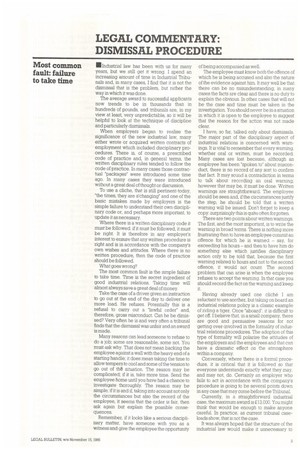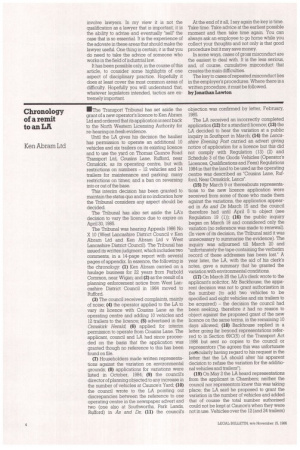Most common fault: failure to take time
Page 45

Page 46

If you've noticed an error in this article please click here to report it so we can fix it.
• Industrial law has been with us for many years, but we still get it wrong. I spend an increasing amount of time in Industrial Tribunals and, in many cases, I find that it is not the dismissal that is the problem, but rather the way in which it was done.
The average award to successful applicants now trends to be in thousands than in hundreds of pounds, and tribunals are, in my view at least, very unpredictable, so it will be helpful to look at the technique of discipline and particularly dismissals.
When employers began to realise the significance of the new industrial law, many either wrote or acquired written contracts of employment which included disciplinary procedures. There is, of course, a prescribed code of practice and, in general terms, the written disciplinary rules tended to follow the code of practice. In many cases those contractual "packages" were introduced some time ago. In many cases they were introduced without a great deal of thought or discussion.
To use a cliche, that is still pertinent-today, the times, they are a'changing" and one of the basic mistakes made by employers is the simple failure to understand their own disciplinary code or, and perhaps more important, to update it as necessary.
Where there is a written disciplinary code it must be followed: if it must be followed, it must be right. It is therefore in any employer's interest to ensure that any written procedure is right and is in accordance with the company's own wishes and attitudes. Where there is no written procedure, then the code of practice should be followed.
What goes wrong?
The most common fault is the simple failure to take time. Time is the secret ingredient of good industrial relations. Taking time will almost always save a great deal of money.
Take the case of a driver given an instruction to go out at the end of the day to deliver one more load. He refuses. Potentially this is a refusal to carry out a "lawful order" and, therefore, gross misconduct. Can he be dimissed? Very often he is and very often a tribunal finds that the dismissal was unfair and an award is made.
Many reasons can lead someone to refuse to do a job; some are reasonable, some not. You must ask why. That does not mean backing the employee against a wall with the heavy end of a starting handle; it does mean taking the time to allow tempers to cool and some of the tension to go out of the situation. The reason may be complicated; if it is, take more time. Send the employee home until you have had a chance to investigate thoroughly. The reason may be simple; if it is and if, taking into account not only the circumstances but also the record of the employee, it seems that the order is fair, then ask again but explain the possible consequences.
Remember, if it looks like a serious disciplinary matter, have someone with you as a witness and give the employee the opportunity of being accompanied as well.
The employee must know both the offence of which he is being accused and also the nature of the evidence against him. It may well be that there can be no misunderstanding; in many cases the facts are clear and there is no duty to explain the obvious. In other cases that will not be the case and time must be taken in the investigation. You should never be in a situation in which it is open to the employee to suggest that the reason for the action was not made clear.
I have, so far, talked only about dismissals. The major part of the disciplinary aspect of industrial relations is concerned with warnings. It is vital to remember that every warning, whether oral or written, must be recorded. Many cases are lost because, although an employee has been "spoken to" about misconduct, there is no record of any sort to confirm that fact. It may sound a contradiction in terms to talk about recording an oral warning; however that may be, it must be done. Written warnings are straightforward. The employee should be seen and, if the circumstances justify the step, he should be told that a written warning will be issued. Don't forget to keep a copy: surprisingly this is quite often forgotten.
There are two points about written warnings. The first, and the most important, is to write the warning in broad terms. There is nothing more frustrating than to have an employee commit an offence for which he is warned say, for exceeding his hours and then to have him do something else which justifies disciplinary action only to be told that, because the first warning related to hours and not to the second offence, it would not count. The second problem that can arise is when the employee refuses to accept the warning. In that case you should record the fact on the warning and keep it.
Having already used one cliché I am reluctant to use another, but taking on board an industrial relations policy is a classic example of riding a tiger. Once "aboard", it is difficult to get off. I believe that, in a small company, there are good and persuasive reasons for not getting over-involved in the formality of industrial relations procedures. The adoption of this type of formality will polarise the attitudes of the employers and the employees and that can have a dramatic effect on the atmosphere within a company.
Conversely, where there is a formal procedure, it is critical that it is followed so that everyone understands exactly what they may, and may not, do. Certainly an employer who fails to act in accordance with the company's procedure is going to be several points down in any case that may come before the Tribunal.
Currently, in a straightforward industrial case, the maximum award is £13,000. You might think that would be enough to make anyone careful. In practice, as current tribunal caseloads show, that is not the case.
It was always hoped that the structure of the industrial law would make it unnecessary to involve lawyers. In my view it is not the qualification as a lawyer that is important; it is the ability to advise and eventually "sell" the case that is so essential. It is the experience of the adovate in these areas that should make the lawyer useful. One thing is certain; it is that you do need to take the advice of someone who works in the field of industrial law.
It has been possible only, in the course of this article, to consider some highlights of one aspect of disciplinary practice, Hopefully it does at least cover the most common areas of difficulty. Hopefully you will understand that, whatever legislators intended, tactics are extremely important. At the end of it all, I say again the key is time. Take time. Take advice at the earliest possible moment and then take time again. You can always ask an employee to go home while you collect your thoughts and not only is that good procedure but it may save money.
In some ways, cases of gross misconduct are the easiest to deal with. It is the less serious, and, of course, cumulative misconduct that creates the main difficulties.
The key to cases of repeated misconduct lies in the employer's procedures. Where there is a written procedure, it must be followed.
by Jonathan Lawton






























































































